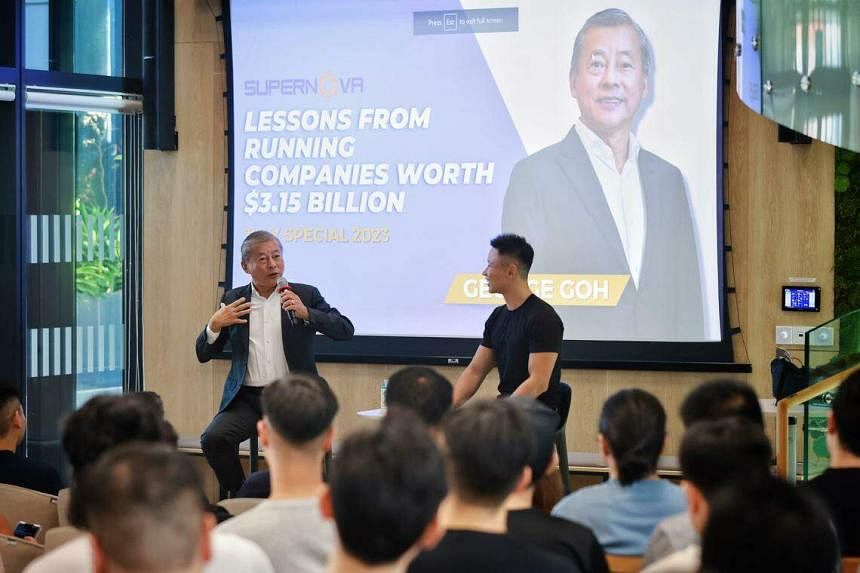PE2023: No perfect English, no problem, says George Goh


SINGAPORE – Speaking perfect English is not the be-all and end-all in communicating with others and earning their trust, presidential hopeful George Goh said on Monday.
Rather, being authentic and showing sincerity may be more important, said the group executive chairman of Ossia International.
On Monday, Mr Goh, 63, gave a talk and held a question-and-answer session with about 120 young entrepreneurs at Singapore Management University.
During the 1½-hour session moderated by business coaching company Super Scaling co-founder Alvin Poh, Mr Goh answered questions about his entrepreneurship experience, such as how he found suitable partners to go into business with.
The presidential hopeful said his less-than-perfect English may have worked in his favour when he pitched prospective partners, such as Harvey Norman co-founder Gerry Harvey, as it came across as more authentic.
“If you speak perfect English, you cannot get the deal one,” he said. “A little bit authentic is better.”
Mr Goh said he persuaded successful businessmen like Mr Harvey to become his partners because his body language and his pitches communicated sincerity.
“When you want to sell to a billionaire, don’t speak too well. Sorry (if) I teach you the wrong way,” he said to laughter.
The jury is still out as to whether or not Mr Goh will be granted eligibility to run for president.
He is not the chief executive of a single company worth at least $500 million in shareholders’ equity, but rather a stable of companies with a collective market capitalisation value of $3.15 billion.
On Monday, Mr Goh reiterated his stance that he has the business experience to qualify.
He said earlier that he believes he could qualify under Article 19(4)(b) of the Constitution. It states that the Presidential Elections Committee must be satisfied that the candidate has the experience and ability – having regard to the nature of the office, the size and complexity of the private-sector organisation and the person’s performance in the office – that is comparable to a chief executive of a company with shareholders’ equity of at least $500 million or more, among other factors.
“I’m the chief executive who manages (these organisations). If you look at the whole thing, it’s one (enterprise),” he said.
Mr Goh said even a good command of English is insufficient to thrive in the business world if that is the only language a person knows.
Replying to a question about whether he speaks several languages, he said he knows some Hakka, and that his minnan yu (Taiwanese Hokkien) opened doors when he sought business partners in the territory.
“Don’t believe only (knowing) one language is good enough for English,” he said. “If you can speak Mandarin now (that) is very good.”

Speaking to reporters later, Mr Goh reiterated that his track record in business showed that he had no difficulties communicating well.
Mr Goh was asked whether he felt his English skills would be an issue working with people internationally and representing Singapore, if he became president.
“Language is one thing. You must understand that when I communicate with you, there’s another word, called body language.
“Body language will show your sincerity – at some point in time, people will know whether you tell the truth,” he said. “Because they look at your eyes, they look at the way you talk, they will know ‘I can do business with you, I can trust you’.”
Asked if any of the attendees expressed support for his throwing his hat into the ring to run for president, Mr Goh said it was the wrong platform to be thinking about the election.
He added: “We don’t come here to say I want to earn the vote... That is very, very unethical. You come here to share your best (experiences) to the young people.”
Mr Goh said he would be very happy if, five or 10 years later, a participant told him he became successful after picking up lessons from Monday’s session.
“Let’s not worry about the election. People know who they want to elect at the end of the day – if you give them the choice they will know – but this platform, cannot talk about election.”
This article was first published in The Straits Times. Permission required for reproduction.